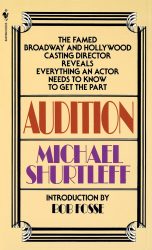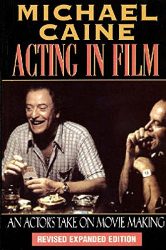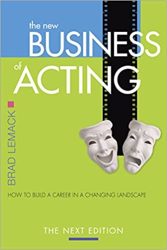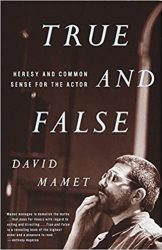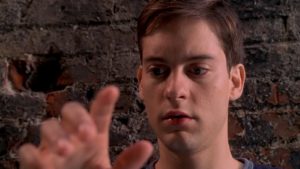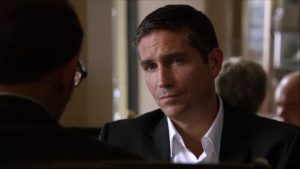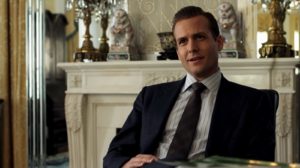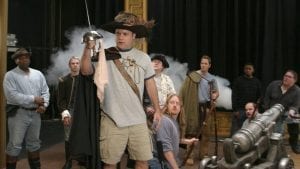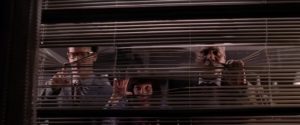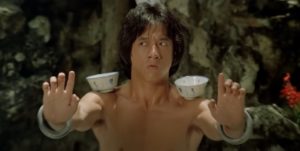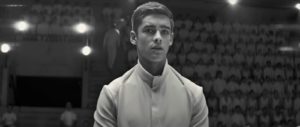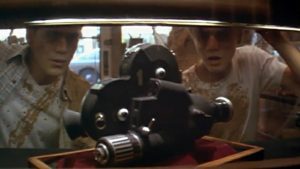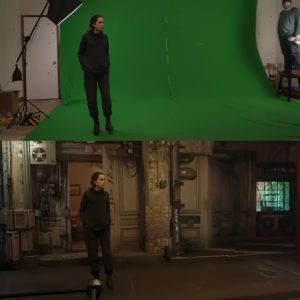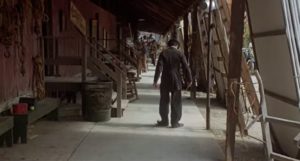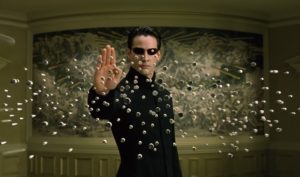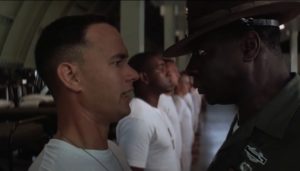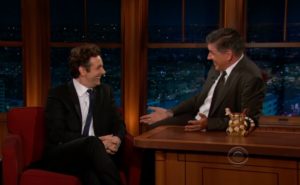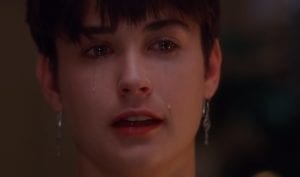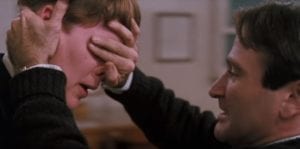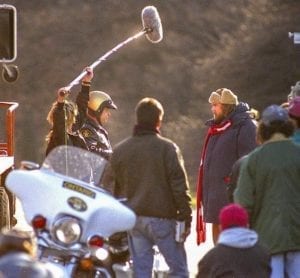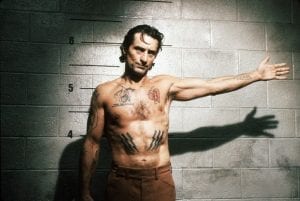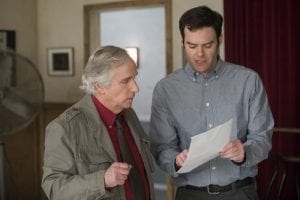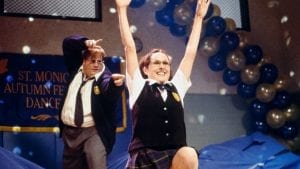
This article was originally meant to be just about how actors get out of character (because that’s rarely discussed) but it ended up encompassing the getting into character aspect as well, because how you got into character can affect your options and ideas for getting out of character.
Actors get into and out of character using methods such as loving their character/self enough to be them, learning new skills, using triggers (appearance, location, etc.), thinking of their backstories, studying the text well enough to be free, getting help, pretending, and using real experiences.
Below is a compilation of categorized quotes (with sources) and summary statements to describe some of the details of how these approaches are used to initially “find” (i.e. understand) the character, turn on that character when about to perform, and get out of the character. Every actor has their own methods (that can change over time and include a combination of things); this article is just meant to summarize them.
Before we begin
Many people talk about how to get into character and there is a lot of talk about actors who insist on staying in character for a long time, but few talk about how to get out of character, even though it is a common challenge for actors. Therefore, to help give the reader a more balanced view, here is a quote from Oscar-winning actor Ben Kingsley:
“You can’t take a character home with you or you’d go mad; at least I would. What I find is that if I leave the character until the next day’s filming, then I go back and get to jump from me to the character. I love taking that running leap from me to him.” – Ben Kingsley (source)
Now let’s begin.
1. Loving your character
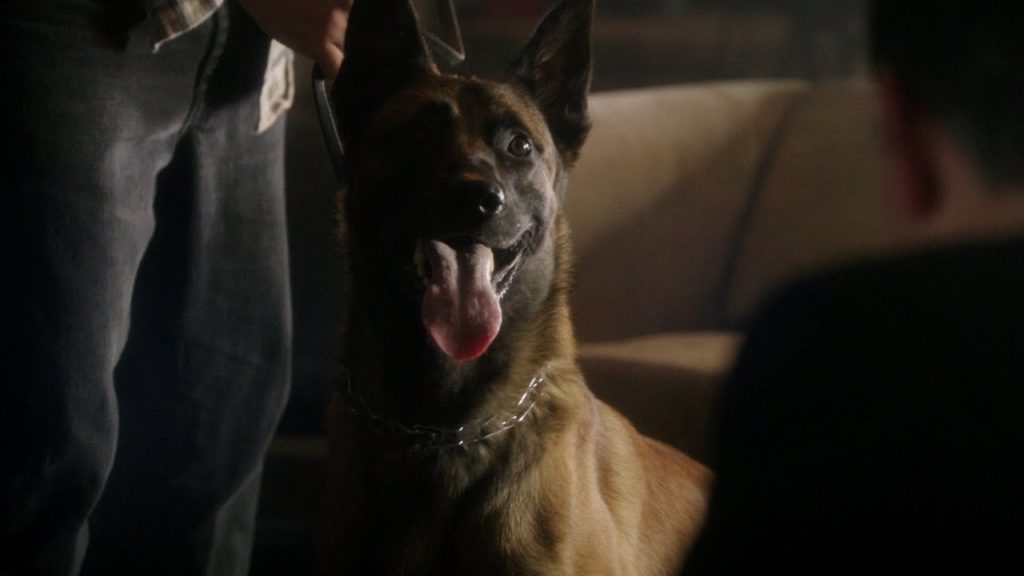
In order to get into a character, it can be important to empathize with your character and know how to love your character. When getting into character, this love and empathy can be attained in the research and analysis process, such as by reading books and watching movies about those types of people, interviewing them, and thinking about how that character might justify their actions. The quotes below provide some details about this part of getting into character:
“You have to know how to love your character. If I were to be cast as a character who is an adopted child, I would watch a lot of movies that deal with children who are adopted and read different books on adoption. I would also interview a number of different adopted children and research what it’s like to be an adopted child and how they feel about it. It takes a long time but during this research process, there is a point where the stereotypes I had about my character fall apart and I am able to think from their perspective. I think I have always gone through this kind of preparation and I’m always learning something new along the way.” – Shin Hyun-jun (source)
“When I was playing a terrorist in Executive Decision on an airplane, wanting the airplane to blow up, I had to find the justification for himself, that particular character, to do that from his religious perspective and felt that he was doing honour to God by doing it. I have to find those reasons. Otherwise you can’t play them.” – David Suchet (source)
During this process you might also find that some of your preconceived ideas have changed. This is a new understanding. Even after you get out of character, that new understanding may remain.
“I didn’t think I was a royalist, and then the more I learn about her, the more I think she’s [obscenity] amazing.” – Olivia Colman (source)
“It was at that moment I had an epiphany, and I went home and started crying . . . I think I am an interesting woman when I look at myself on screen. And I know that if I met myself at a party, I would never talk to that character because she doesn’t fulfill physically the demands that we’re brought up to think women have to have in order to ask them out . . . There’s too many interesting women I have not had the experience to know in this life because I have been brainwashed.” – Dustin Hoffman (source)
Nevertheless, actors can also use love to get out of character. Here are some quotes from actors using their love of their lifestyle and people and things outside their acting career bubble to draw them out of their character:
“I’m not showing up to do brain surgery. I’m not showing up to cure cancer, but I’m showing up to play and give voice to the voiceless. I love who I am as a person. So, I love my lifestyle. I love playing chess, you know? I love fumbling around on the guitar, I love being present with people. So, I don’t lose myself so much, because I love who I am. It’s a skill of being able to go in and understand that I’m doing this for a slice of time compared to somebody that actually had to live this for their whole life. … I love who I am enough that when they say cut, I’m able to come back and be Rob Morgan.” – Rob Morgan (source)
“I have a lot to distract me that is away from my work and things that are more important, namely my family, so whether it’s through them or a little bit of exercise and fresh air, reconnecting with friends and stepping outside the bubble, I do manage to disconnect and disentangle myself from my work. I think that’s as important for everyone around me as myself to be able to do.” – Benedict Cumberbatch (source)
The opposite of the things above can make it difficult to leave a character, such as if an actor feels they have few things outside of work or if they enjoy being the character more than they enjoy being themselves:
“When I prepare for a role, I am so busy all the time. I have to exercise, practice my lines, and think about how I am going to present myself. When the project ends, I look back on it and I feel like Park Shin Hye has been gone from the world for three to five months during the year. Even though I am at home, which is a place I am used to, I feel really different. While filming, I spend a lot of time on sets and it’s always hectic there, so when I’m by myself, I do feel lonely and empty. Personally, it takes me a long time to feel normal because even exercising, which is a part of my daily routine, feels really awkward.” – Park Shin Hye (source)
“Well it is very easy to switch off; the problem is that sometimes he [Frost] does not want to be switched off. Part of the whole process of playing these characters is that ultimately I am just playing myself in different circumstances. So I look for what I might have in common with the character and then take that part of myself and just make it bigger. So it becomes sort of impossible to switch off because it is part of me. So for that period of time that part of me becomes more dominant in my personality. But with Frost especially he is not just a character, he is a way of life. It became more enjoyable to be Frost than it was to be me for a long time.” – Martin Sheen (source)
2. Learning new skills
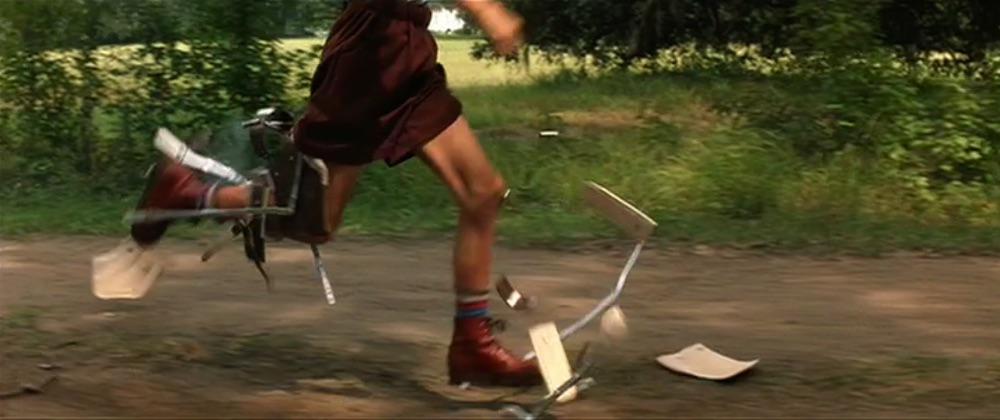
Finding characters isn’t all about learning new ideas – it can be through learning new skills as well. Getting a character’s skill right so that it doesn’t feel clumsy can help actors in finding and portraying their character. Some such experiences are described in the quotes below:
“I didn’t know how to ride horses before the film, so a lot of the character I found while I was learning how to ride and the physicality of that. … So much of the character was found in doing the arms training and in learning how to reload a gun fluidly so that it looks like you’ve been doing it forever.” – James Frecheville (source)
“It depends on the role, but the one consistent thing is that I need to feel like I’m that guy—that I have the confidence and the authority to inhabit that character. And usually it comes not from traditional research like backstory, but from learning something. In Platoon, I knew how to clean that rifle. I knew how to move in the jungle.” – Willem Dafoe (source)
“A great portion of my life takes place in the country, so things that I needed to learn for Emily are things that I in my real life are trying to learn. [laughs] Self-sufficiency, getting by without a man to help, and a lot of my progression was also physical — learning how to bake bread so it didn’t look clumsy, shooting, loading and firing a gun, target practice.” – Michelle Williams (source)
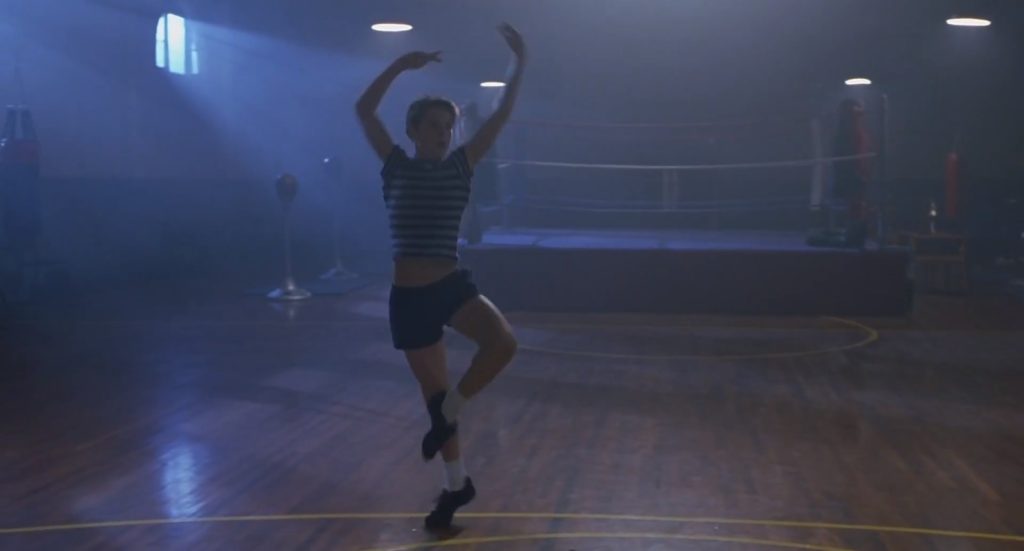
Learning new skills can also help actors get out of character. For example, this is how Park Shin-Hye says she gets out of character:
“I find something new to learn. After The Heirs, I took a course in flower arranging.” – Park Shin-Hye (source) Of note, Park Shin-Hye’s quote about being very busy during projects is in the previous section about loving your character.
Additionally, pre-existing skill-based hobbies can help actors get out of character. As mentioned previously in the “Loving your character” section, Rob Morgan plays guitar and Benedict Cumberbatch does exercise. Other actors have mentioned that riding motorcycles and swimming can help them get out of character:
“[Riding is] a thing that I do to relax, unwind and take my mind off things. It helps me get out of character after a movie or series. When you play certain characters, you become them for weeks and sometimes it’s hard getting out of that mental state. Biking allows me to just become myself again, connect with great souls and passionate riders from across the world.” – Amit Sadh (source)
“Well, it’s not that black and white. A swim always helps.” – Alex Deimitriades, on whether he has a process for getting out of character (source)
3. Appearance, voice, location, and other triggers
Especially if it is different from what the actor is normally like, the way a character looks and sounds can be used to help an actor find a character and trigger the getting in and out of character. Similar to learning new skills, an actor can work on getting the character’s appearance (including movements) and voice right in order to get the feel of the character. This stage of the research process is described in the quotes below:
“…what seems to be my approach is to get [and] find out the external tics and manifestations of his character … and looking at a lot of television footage and listening to radio interviews he had done and reading books about him and reading what he had written. So I’ve sort of developed the physical side of the character and the vocal side of the character first. And then from that, sort of the character itself, his psychology seems to fall into place, particularly when the writing is so brilliant and it’s all there.” – Jim Broadbent (source)
“Preparation is very important. I start by looking at many things, from clothes to music to voice. I know it sounds weird, but sometimes figuring out the clothes can really start to help you inhabit a character. It’s different every time. Sometimes it’s music, sometimes the voice is important first.” – Edward Norton (source)
“I have always been one of those actors who likes to go from the outside in. I like to play with props and different looks. Whether it is glasses, the clothes he wears, the color of his tie or tie clip, I like to play around with the look of the guy . . . that is usually what I do with these guys, start from the outside in and then you find them as you go along.” – Spencer Garrett (source)
Later on, after the character has been found, costumes can be a trigger for quickly getting into character, as described in the quotes below:
“It’s weird – a lot of the work is done for you before you get there and a big part of that for me is costume. We have such wonderful costume on the show, so I find when I put it on, it has an inherent gravity. It’s very grounding – that’s how I fall into Jon Snow … That and many, many hair products.” – Kit Harington (source)
“…as soon as he is in his cloak, he walks and talks like Snape—it’s quite terrifying.” – Tom Felton talking about Alan Rickman (source)
In fact, the connection between costume and character can be so strong that it can trigger the getting into character even years later:
“That’s why I don’t have one souvenir in my house from any movie I’ve done. Because if I held onto a jacket or a hat, and I put it on again? That minute I would be right back in that character.” – Lance Henriksen (source)
“… one thing that always helps is to just walk onto the set. Only now I can’t walk into my office anymore… But just walking onto the sets has been almost like a welcome home gift. Or to step into his three-piece suits has been something special as well. Sometimes it doesn’t take too much. I remember when I did a character called Tony in a film called Pusher, and we did a second film 10 years later with the same character. I remember I was like, “Oh my god, do I really want to do this again?” But then I shaved my hair — he was bald — and the second I went there, and they started to do the tattoos on my skull, it came back, something came back. So I’m sure that’s going to happen once we start dressing up again and seeing the cast and locations.” – Mads Mikkelsen (source)
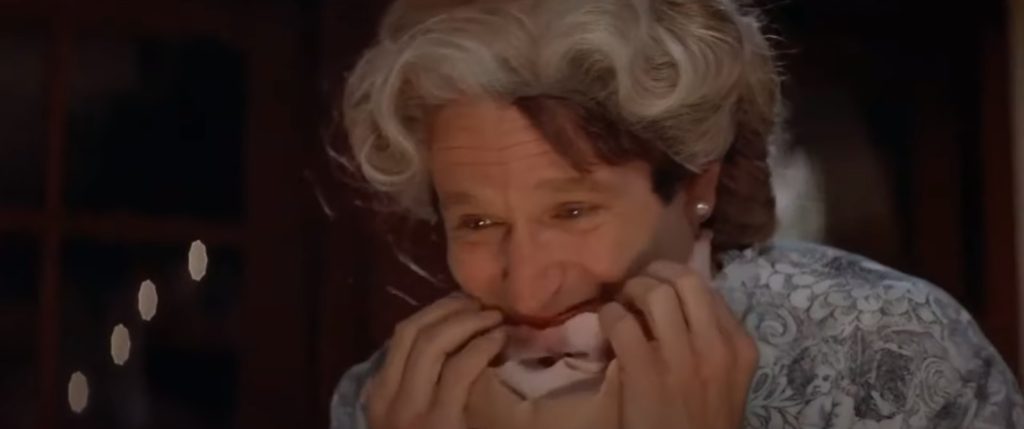
The above quote also shows that being on set can also act as a trigger and that being off set can get someone out of a character. Actors can also get out of character by removing make-up and costumes if those are triggers for them. Similarly, changing location by traveling can help actors get out of character.
“I dress up when I come on set, but when I take Aslam’s accessories off, and wear my watch, become clean-cut, I feel like Sheheryar again. Even if it’s just to sit in my car and go home. That’s my way of getting out of character.” – Sheheryar Munawar Siddiqui (source)
“I tend to shed my character with the makeup remover. By the time I am uncorsetted, unwigged, undressed and dressed again to leave the theatre, I have left the world of the play. The particulars of that performance may linger for a bit – the mishaps, the marvels, the cellphones that went off, the responses of the audience that night- but I don’t need to ‘come down’.” – Seana McKenna (source)
“After we finished Trautmann, I went on a surfing trip to Portugal for two weeks. Surfing and getting rinsed by the ocean was a perfect way to completely unwind from the previous project and then make a fresh start on the next one.” – David Kross (source)
Actors can also actively create triggers for getting into character, such as through associations with music:
“I also like to choose music for each character. I usually a specific song to play in my trailer in the mornings while I’m getting ready.” – Julie Ann Emery (source)
“Music is good for me. I have a playlist for each character which I might play in the car on the way to work. It’s about concentration and getting out of the way to give yourself unto it.” – Michael Riley (source)
There are many things that can be used as triggers for getting in and out of character, including a snap of the fingers or just hearing the word “cut”:
“It was like that. I got hypnotised. I told a hypnotist I have to be a 16-year-old girl and he gave me a thing and just snap once and I was in.” – Jack Black (source) on how he got into character to play a 16-year-old girl.
“Some people, if they’re playing a very emotional part, it can take hold of them a bit, and I don’t have that. I feel it very much in the moment. But as soon as they say, ‘Cut’: Ahh. It’s cathartic. I actually feel much lighter, having had a good cry.” – Olivia Colman (source)
“… because he is a man driven by fear and hate, a man who was constantly belittling African Americans and using language that would make most men cringe. I made it a point in-between takes to get in and out of character quickly because I did not want to stay in that mindset for the actors around me. It was the first time I worked where I found little triggers to safely get back into character.” – Lane Garrison (source)
4. Backstories and inner life
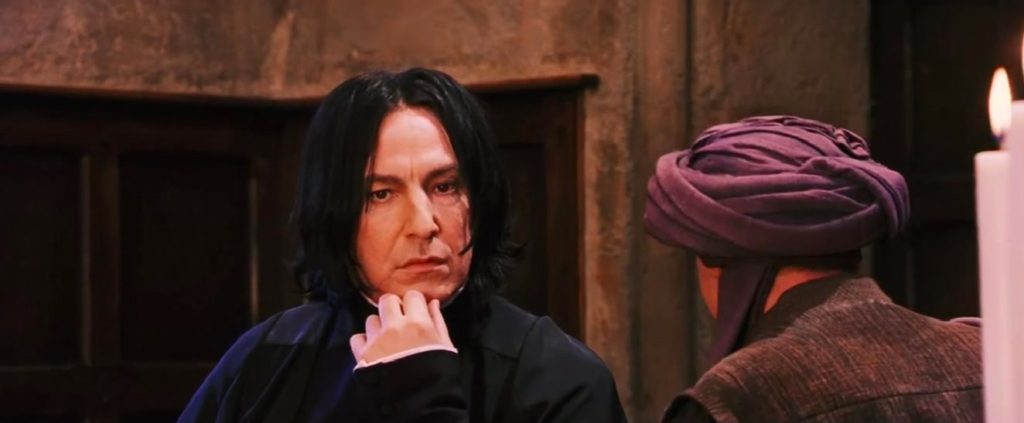
In addition to learning a character’s behavioural mannerisms and being able to empathize with the character (described previously), finding a character can involve learning about the details of the character’s life. These details can be about the character’s history, thoughts, and habits – things that the character knows, as described below:
“There are different ways of preparing… There’s only one thing that I always do, which is ask myself what happened from when the character was literally born until the first page of the script. That’s where it always starts for me. If you do that, you’ve already done half of the work, because that could be a lifetime of exploration if you want to.” – Viggo Mortensen (source)
“I remember it very well how I analysed Hans Gruber, the bad guy in Die Hard. I wanted to know what he eats for breakfast, where he comes from and how he thinks. The director didn’t care about these details, but I think that the way I portrayed Hans Gruber was more believable because of them. The same goes for Snape in Harry Potter.” – Alan Rickman (source)
“It was a lot of familiarizing myself with the journals that the women wrote during their time on the trail.” – Michelle Williams (source)
The details can also come from a deep analysis of the character, yielding information that even the character might not know:
“I wanted to investigate him. I actually had to ask a lot more questions than Ennis would ever ask himself and essentially I knew more about him that he would ever know… Then there was his physical aspects like how he would walk’ and act, I wanted him to be like clenched like a fist, even to have his mouth be clenched, any form of expression had to be painful. I put a lot of thought into that…” – Heath Ledger (source)
“Lots and lots of character history. Lots of behavior analysis. Lots of relationship work. Research. And then identifying the characters rhythms and headspace. I like to find opposites in characters. Oppositional behaviors.” – Julie Ann Emery, on he she prepares for roles (source)
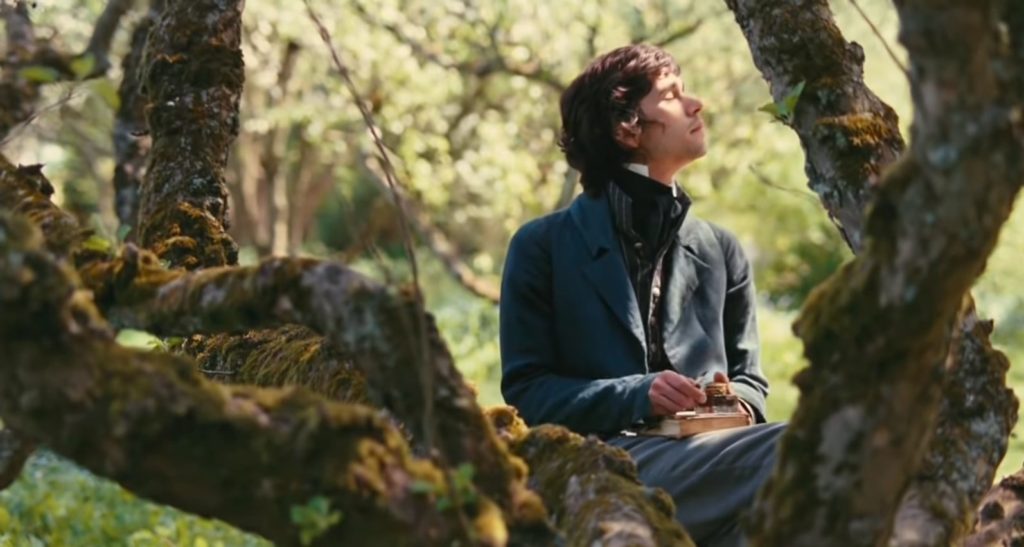
Some actors have found that thinking about their own lives, through analysis or just by repeating details, can help them get out of character:
“…a dear friend of mine who’s a psychologist, came backstage and said I was still in character. And he gave me a way of getting out of character so that I wouldn’t bring characters out of the theatre with me into my real life, and he made me repeat in front of the mirror lots of personal details about myself, including silly things like telephone numbers and addresses and my children’s date of birth, to bring me out of the character and back to myself.” – David Suchet (source)
“The hard part of getting out of character is you have to ask the difficult question ‘Who am I?’ If I say, ‘Who is John Brown?,’ I point to all these facts. If I say, ‘Who is Chet Baker?,’ I can start to study that person… If I’m not trying to please my mother, and I’m not trying to please my father, and I’m not trying to please an audience, I’m pleasing myself. It brings me to a very adult question: Who is this person I’ve been calling Ethan?” – Ethan Hawke (source)
5. Studying the text
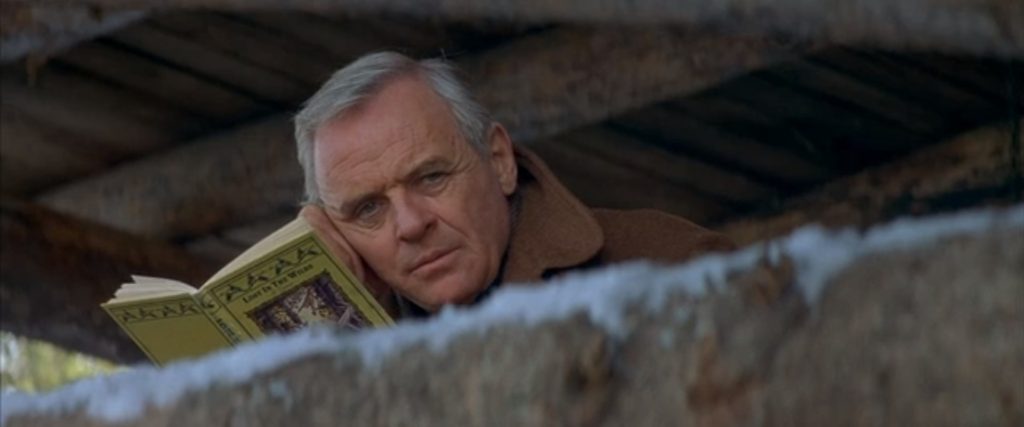
Knowing the text extremely well and thinking about what the author wanted to convey can also help actors find their character. Some thoughts in this regard are described in the quotes below:
“I take them out of the play to see what is missing, rather than say, ‘how do I play this role?’ I say, ‘why was he written?’ And I can only do that by removing and it’s like cooking really, you say what’s missing? What do we need here? A bit of spice, a bit of salt and pepper etc, etc. So that’s what I now do with my plays, I take them out and that way I know I’m serving my writer as well.” – David Suchet (source)
“I like to be incredibly off book. I don’t like to be thinking of my next line or cue while I’m in the scene. I like to be thinking the thoughts of the character.” – Julie Ann Emery (source)
“I learn the text so deeply that I think it has some chemical effect in my brain . . . Once you know [the text] so well that you can improvise and make it real, it’s easy.” – Anthony Hopkins (source)
As stated in the quote above, knowing the text thoroughly can help think relevant thoughts during the performance. Actors can really listen to their scene partners and help them look good, the importance of which is described below:
“As an actor you’re just a channel, a medium that conveys the author’s text to the audience . . . But it’s not enough to know your own lines only. It’s at least as important to react to the other actors’ lines. If you really know how to listen, your reactions and dialogues will be natural and free.” – Alan Rickman (source)
“You read through the script a hundred times. It’s imprinted in my head during rehearsal. There’s a point where you just let it go.” – Heath Ledger (source)
“I feel quite ashamed sometimes admitting how little research I do and that I just learn my lines. Nobody wants to believe me. But I learn my lines for weeks before a film. The goal is not to let any of my actors or the director down. I’m floored with admiration for Spencer Tracy, and one of his tenets was, ‘Make the other guy look good.’” – Ben Kingsley (source)
This focus on the text and what the author wanted to convey through the story-lines can help actors see themselves as separate from their character. Actors can recognize that the character’s choices are not their own choices. Seeing yourself as separate from the character from the very beginning can make it easy to get out of character.
“The script that someone’s labored over, I would rather make work—I’d rather make the lines on the page work than arrive on the film set in the morning and say, ‘I don’t think I would say this, I would say something else.’ Because it isn’t me making those choices. It’s the character who has to make choices.” – Ben Kingsley (source)
“What I usually do is try to work out what it says on the page. That’s what I’m hired for. I’m not an investigative journalist who needs to dig up the hidden and dirty truth about some living or recently deceased character. I’m an actor and the actor should do what’s in the script. At least, that’s my old-fashioned opinion. And then you have to coordinate all your good intentions with your partners. It needs to fit into the director’s intentions. Movies are a director’s medium. It’s their story in the end.” – Christoph Waltz (source)
“So my job is to be supportive of actors and the lead story-lines. You’re not expected to be the centre of attention, your goal is to serve the story-line as well as possible . . . it’s something that I’d like to take with me going forward, that perspective of serving the other story-lines . . . Before I started working — having taken a few years off from the business to raise a family — I found a studio called Warner Loughlin Studio and what they taught me was a technique that I have so appreciated. It uses more creativity to develop a character separate from yourself that you can connect to and disconnect from in a healthier way. Being a mom with kids, it would be very difficult to carry around a character like Erica around with you and so working with this particular method I can jump into things having created a full reality for Erica, be there 100% and as soon as a scene is over I’m back to being AJ.” – A.J. Langer (source)
6. Getting guidance/help
Actors can also get help with getting into character and out of character. Related to the previous section about looking at the text from the author’s perspective, an actor can also communicate with the writer directly to help them find the character:
“I always feel it’s important to have the writer there as much as you can because they give you all their experience. He was so helpful with every detail that he knew about and used his instincts when he didn’t know for sure. . . And again I followed my instincts, based on the writing, where they thought there was something I could add or take away or whatever.” – Robert de Niro (source)
“I spoke at length with the writer, who had more access to other materials.” – Matthew Goode (source)
When finding the character, actors can also talk to people who knew the person the character is based on or people like them:
“. . . the most sort of I would guess off-the-page preparation I did read was meeting some of his family and a colleague who worked with him in Manchester and speaking to another colleague as well who had worked with him.” – Benedict Cumberbatch (source)
“I went to talk to two lovely women who work for a charity called Refuge in the UK which helps victims of domestic violence. They answered a lot of my questions. My preconceived ideas about domestic violence… they put me straight on a few things. They gave me case studies to read which were just shocking, much worse than anything you saw on screen. That sort of informs your performance in the back of your head.” – Olivia Colman (source)
“I think I had two weeks at most to prepare. What I did was go around to as many people as I could. I found two Jewish friends who had been in Auschwitz . . . Then I went to the other end of the pendulum and found a Polish fascist who was anti-Semitic . . . I went to him to get the Polish accent, but he fed me enough to help me build the character.” – Anthony Hopkins (source)
Actors can also get guidance through prayer, or from a director, and from someone similar to the intended audience (which could be especially helpful when playing a fictional character who is different from everyone):
“As I was home, going through the script, I was also rehearsing her character and her mood and I said, ‘The director is there to guide me.’ That’s how it happened . . . When you act, you cannot see yourself. Your director is sitting there, watching you or watching the monitor and can tell you best if you are on the right track or not.” – Clementine Mosimane (source)
“The moments before the play begins is a tricky space. This is always different for me. Getting backstage and into the dark of the theatre is vital, then leap, leap, leap – let the play lead you, moment by moment. I pray too. Yes, pray. I ask that I honour the woman/man I will portray. Then I hand over.” – Jennifer Steyn (source)
“Early on, when I was working on Wonka, the character, trying to figure out what he was going to be, what he was going to look like, sound like and after having tons of conversations with Tim [the director], I would test the voice out on my daughter, Lily-Rose. It seemed to work on her so I kind of ran with it.” – Johnny Depp (source)
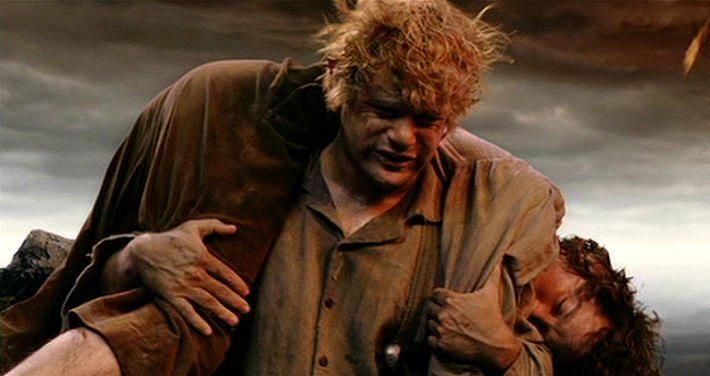
Similarly, the quotes below show that actors can find that spending time with people who know them personally and getting guidance through prayer can help them with getting out of character:
“I took three to four days to really get out of character . . . On the third day, I told myself that I couldn’t let this continue, so I went out with my friends and did whatever I could to get out of character. I felt better after that, and for me, this was the toughest role to get over to date.” – Richie Koh (source)
“Once I’d found how I was going to portray Churchill, how I would tackle the role, I immersed myself in the part like never before in my career. When I left the set to go home at the end of the day, he came with me. My wife would say, ‘I go to bed with Winston Churchill but I wake up with Gary Oldman!’. Which I suppose is better than the other way around!” – Gary Oldman (source)
“You have to separate the role and who you are. Praying before playing any role has always been able to help. I ask God for guidance to be able to portray the role honestly, without losing myself.” – Clementine Mosimane (source)
7. Pretending
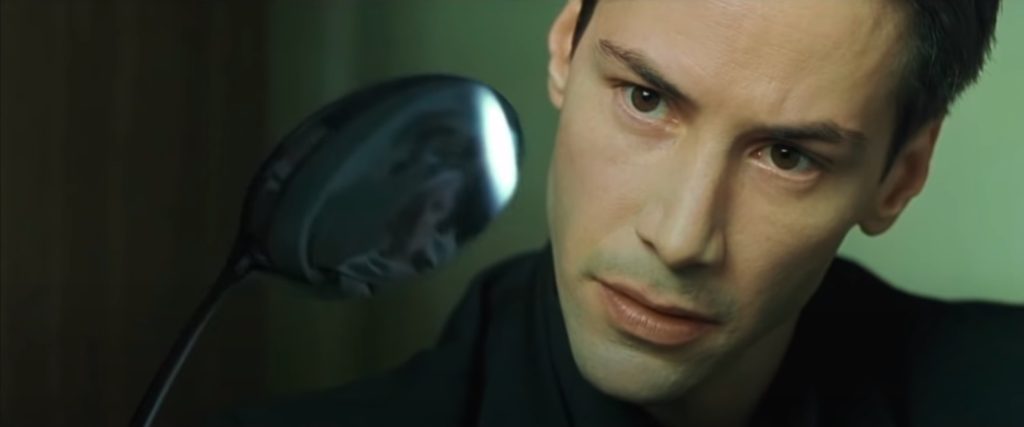
Focusing on the emotional state of the character and turning on those feelings, pretending, can help with getting into character. Here is how some actors have described it:
“I like to think of acting as only what you’re doing when you’re playing pretend.” – Jeff Goldblum (source)
“I think each person you play has a little bit of you in it — you can’t really help that. I’m really rubbish about talking about that sort of thing. I don’t have a process, I just feel it. My book on acting would be very short.” – Olivia Colman (source)
“I just like to put myself in the fur of the panda. ‘What’s the panda going through? What’s his emotional state?’ And I’ll take a minute. I just don’t like to be rushed. Sometimes I’ll go, ‘Hold on a second. Let me just imagine it for a while.’ And I’ll do some little guided imagery of my own sort of a self-hypnosis.” – Jack Black (source)
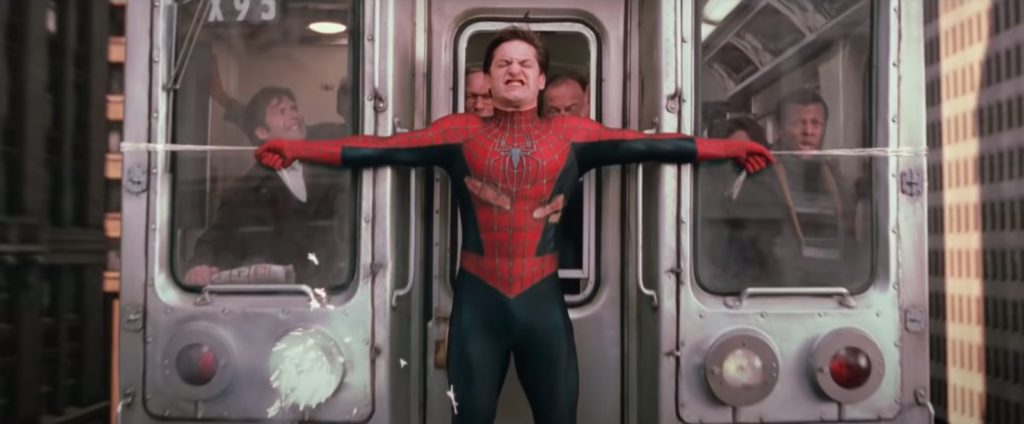
The quotes below describe how going all out with your pretending during the performance can also help actors get out of character:
“When you’ve really given what you’re supposed to give, there’s no going back, and you don’t feel like you have to go back. You only relive things when they’re not lived fully in the moment. It’s like in life, in a love story, for example, when it didn’t really go where you wanted to go and it haunts you. I think acting is pretty much the same.” – Juliette Binoche (source)
“What I think is that if you don’t get the chance to express everything, if you don’t get the chance to get it all out on set…. Then you take it home with you.” – James McAvoy (source)
That being said, Ben Kingsley (who believes in not taking characters home with you) warns there is a danger of changing yourself permanently and states that he pays attention to warning signs to make sure he performs within limits he can handle:
“Apparently if you stretch something it will shrink back to its original shape. But if you stretch it beyond its point of elasticity and let go, it will not shrink back to its original shape. It is permanently distorted. So I have to stay within my limits of elasticity, otherwise it can drive me insane.” He states that warnings signs can maybe be “exhaustion for no particular reason. I do have warning signs and I pull back. Usually it means that I am doing too much, you know. I am not being economical like I said earlier. If I become economical and just stick within the essence of the story and the character, then I’m not stretching myself too much. But it is a risk.” – Ben Kingsley (source)
8. Real experiences

Actors can also find characters with help from personal life experiences that they either already had or acquired in the preparation for the role. The imagination that accompanies the experiences helps find the character. For example, in personal experiences, it is important to use your imagination to identify the aspects of your own life that are relevant:
“I played Bishop the way I was when I was 12 years old. The whole time I was looking at people thinking, ‘If they treat me like [obscenity], I’ll forgive them because I’m going to outlive them.’” – Lance Henriksen (source)
“ . . . you find a time in your life where you felt something similar to this and you try and understand why it made you feel that way and what it was about and why it affected you. Then you manipulate the situation that you’re doing on screen, and fit it into those very real memories and emotions.” – Maisie Williams (source)
If acquiring new experiences, the imagination can go towards helping the actor acquire a new way of looking at things to give them ideas for their character:
“I wanted to know the desperation that comes with hunger, and also it was very important to Roman that there was a very clear difference in my physical appearance. I lost 30 pounds in six weeks . . . And in doing that it became very real. I had no energy for anything else but that, for piano lessons, dialect lessons, rehearsal and thinking about food. Missing everyone and everything good. At that time I was also immersed in the memoirs. It put me right in the character. I wanted to feel that I was experiencing him, I wanted to feel the journey and I did feel it.” – Adrien Brody (source)
“Considering the way that I work very often, I do feel I’ve been soundly misrepresented so many times that there’s almost no point in even talking about it, but people tend to focus on the details of the preparation, the practical details in this clinic or that prison and so on and so forth. I’m sure you know what I’m talking about. But for me as much as that work is a vital part of it and always fuel to one’s fascination, one’s curiosity, the principal work is always in the imagination. That’s where it’s going to happen if it’s going to happen anywhere at all. The imagination in very close working partnership with the subconscious, I think”. – Daniel Day Lewis (source)
Some actors choose to stay in character after they have put in a lot of effort to find the character; others may find it difficult to leave the character given how much they’ve come to relate to the character.
“If you go to inordinate lengths to explore and discover and bring a world to life, it makes better sense to stay in that world rather than jump in and out of it, which I find exhausting and difficult. That way there isn’t the sense of rupture every time the camera stops; every time you become aware of the cables and the anoraks and hear the sound of the walkie-talkies. Maybe it’s complete self-delusion. But it works for me.” – Daniel Day Lewis (source)
“There were times when I was concerned that I might not be able to get out of that state of mind because I didn’t realise how far it had taken me.” – Adrien Brody (source)
“Well, sometimes when you’re playing a teenage girl . . . who is just like you or similar to you, you can get lost in it and it can become very honest and real.” – Maisie Williams (source)
As these are real experiences, from the same world as the actor lives in, they can continue to affect the actor afterward, like other real experiences do. Knowing that they are affected by their roles, some actors keep this in mind when choosing their roles, considering about what additional life experiences they would like to acquire.
“It never goes away. It’s funny, every role I do, it leaves its mark on me, it leaves its trail.” – Lance Henriksen (source)
“I mean, all the characters that you play are just aspects of your own self that you’ve heightened and manipulated, so you never completely shake off a character. You just pack it away for another day.” – Fern Sutherland (source)
“I strive to find material that I will grow from, that will inspire me or educate me about some social issue that I don’t even know about, or that I do know about, but I want to learn more, about struggles that I haven’t had to endure. And that gives you a greater understanding of the suffering that exists in the world, and also the joy that exists in the world.” – Adrien Brody (source)

For getting out of character, it can help to play characters who are very different from themselves, to help distinguish between personal memories and memories related to the character. Maisie Williams draws upon pre-existing personal experiences and stated that playing a character with an accent or using a costume and make up can help her separate herself from her character:
“I think that because I was so young, I didn’t really know how to protect my own emotional state. I did that quite often where I dug up a lot of things that made me feel horrific emotions — and that’s what I ended up being praised for, you know? But I think now I’ve learned to protect myself more and not have to dig things up that hurt as much. I still do that, but there’s a way of doing that now which is more about the imagination . . . I think what really helps for me is when I can play a character who has an accent! Then it’s like a distance between yourself and the character. You can also do that with costume and make up… Being able to create this new person is ultimately something which really protects me at the end of the day: being able to remove all the make up and the wig and the clothes and leave it at work, and then go home and be myself again.” – Maisie Williams (source)
More information on this type of differentiation between yourself and the character is described in the “Appearance, voice, location, and other triggers” section above.
Regarding actors who acquire new experiences for a role, it is interesting to notice that, while some actors undergo these new experiences while also focusing on replicating the character’s psychological state, others undergo such experiences as themselves and focus more on the actions. Willem Dafoe describes this different approach below. Although his new experiences do change him, it appears that he considers those experiences as his own (not tied to characters), and he can leave characters easily:
“You know, emotionally, you don’t prepare for it. But what you can do is you can learn how to do soldier things. And then we created, and I love to work this way, we created a situation that was like a parallel thing to the fiction that we’re doing. Because we really were living out in the bush for two weeks without anything. And training really hard. And a little scared. We never slept, really slept very little . . . you wanted this stuff to become second nature. You want to get so comfortable with this weapon, that you’re sleeping with it. I mean, you really were. And actors always like to brag about their process. But when it’s tied to something practical, it’s really beautiful, because then it gets into your body, and it became second nature. And you are having experiences that open the door for you to think and feel differently . . . If you commit to doing the task in a committed way, something will happen to you. And then you direct, you know, you can direct that emotion to the next step. So it’s not about emotion, it’s about doing things. So my approach has always been, I feel, I’ve said this before, but it maintains true, I feel more like a dancer than an actor. I’m more comfortable with the word ‘performer’ than ‘actor,’ because actor has the baggage of character, text, and psychology. And sometimes those are the least important things in a performance. In movies, most beautiful things are not those things . . . You don’t tell people stuff, you do it, and then the other people that you are working with, and to some degree, you, frame it. Or you know, put it in a certain context. And that’s the performance. And people will see what they will see.” – Willem Dafoe (source)
“It’s nothing. It’s easy, it’s all pretending.” – Willem Dafoe, on how he experiences jumping from character to character (source)
“I have that in my memory. And in my body. And I learn things that give me a different perspective. And when you learn those things, you can’t go back. You can forget them, but they’re still in there somehow. So I feel like every movie changes you. Some more than others, obviously.” – Willem Dafoe (source)
More such action-based new experiences are described in the Learning New Skills section above.
(Why didn’t I group this section with the “Learning new skills” section? Because they talk about different types of memories. Procedural (skills) memories, emotional memories, and episodic (event-based) memories involve very different parts of the brain; therefore, it is possible their effects on actors are different.)
Thoughts to keep in mind
This article contained some info suggesting that some actors are able to leave their characters behind quickly/easily. In fairness to those actors who state that they do not have that ability, it is important to note the possibility of error, as illustrated in the example below:
“Once, during an interview in front of my wife, I was asked, ‘Are you one of those actors who brings your character home? Do you stay in character?’ I said, ‘No, not really. I don’t do that,’ and she started laughing. I asked her why. She said, ‘Well, you might think you don’t bring characters home, but you do.’ So, while I don’t feel like a character is lingering, it probably is.” – Jeff Bridges (source)
Also, even actors who believe in the importance of getting out of character quickly may be aware of their occasional difficulties with that task:
“I’m pretty good at figuring out what is reality and what is not. The tricky thing for a lot of actors including me is that if you spend a lot of time with a character—meaning you’re in character eight, nine, ten hours a day—some of that starts smudging off on you. You get that energy even if you don’t want that energy—you’ve done it so much that it’s part of you. I’m aware that it’s not me but it can be a little tricky to throw off sometimes. In general I try to divide it as sharp as I can. Enter the character as fast as you can, as honest as you can, but also try to leave the character as fast as you can. I don’t believe in carrying it around in my private life to make it more convincing. I think that would take a toll on me and my family. I think you can step into a character as fast as people who never leave it.” – Mads Mikkelsen (source)
Finally, we can see above that some names are mentioned in multiple sections and that some quotes contain references to multiple approaches. Many of the actors quoted above have said that the way they work is always different. Furthermore, actors’ methods can change as they continue to learn and adapt. Hopefully, this article has helped you learn something new and helpful too.
“. . . it’s different every time. Because I think what we don’t talk about enough is for every project it requires a different kind of performing. A different kind of approach. And that’s my joy actually, in finding that. That’s the excitement.” – Willem Dafoe (source)

